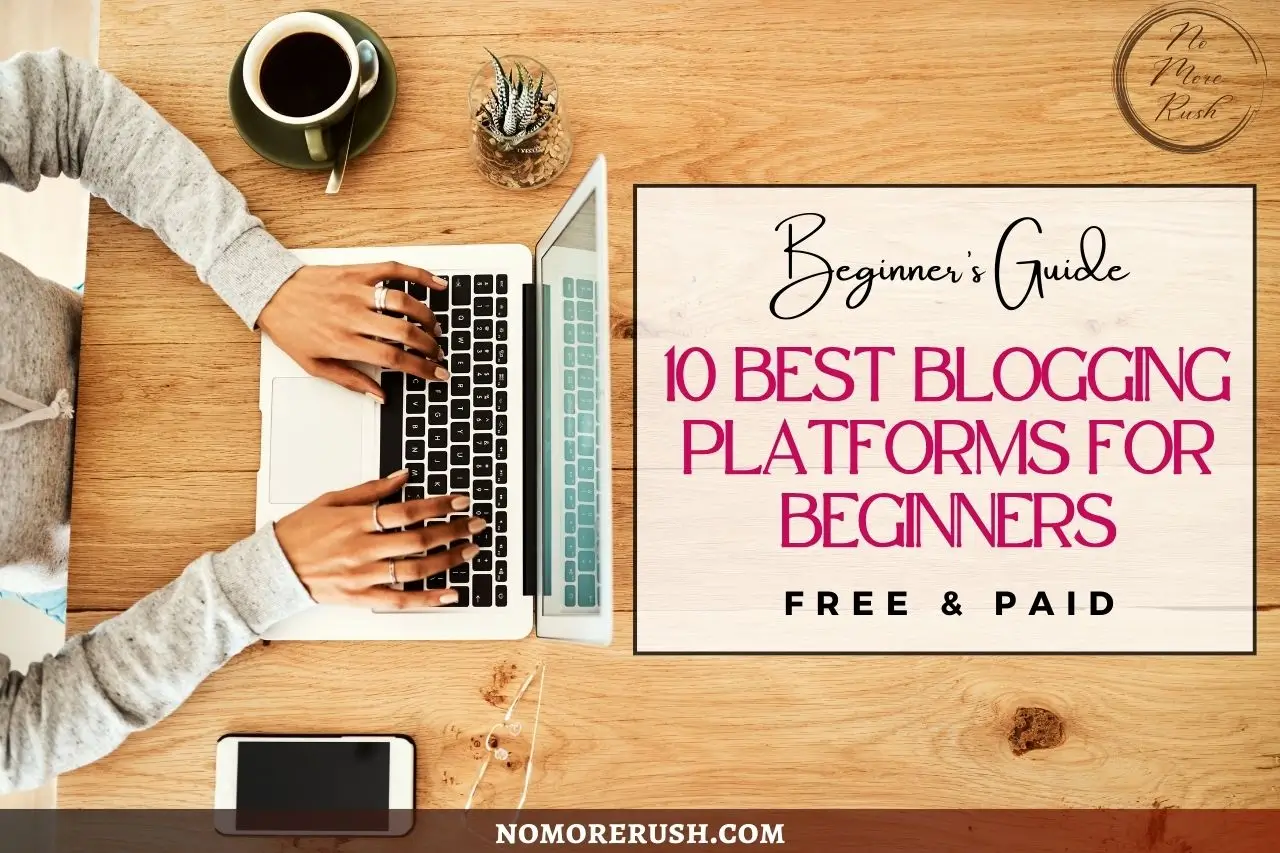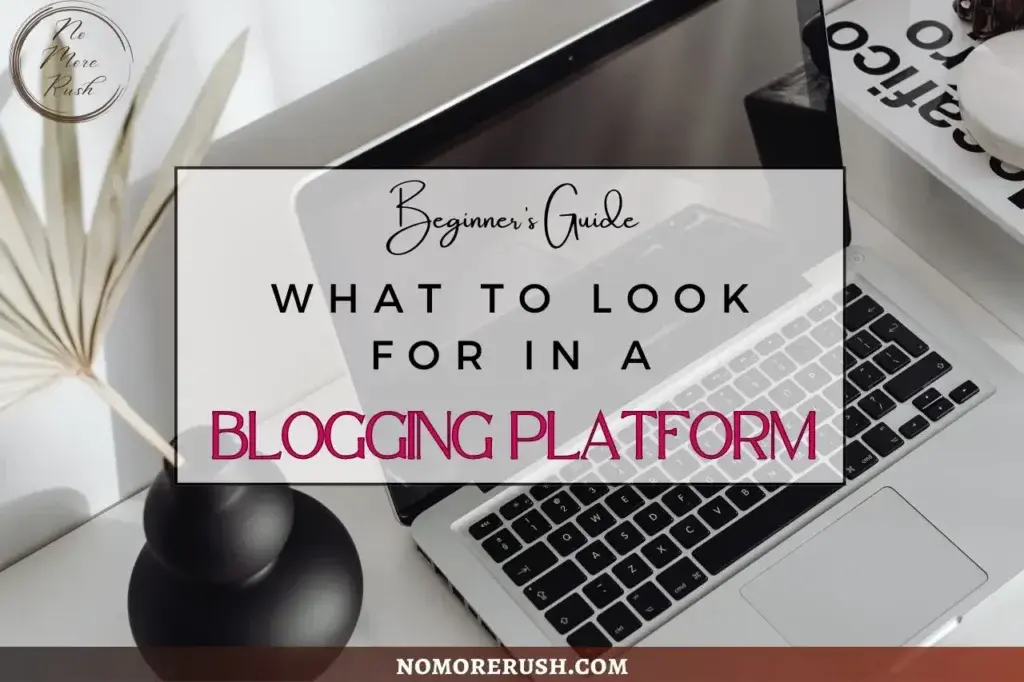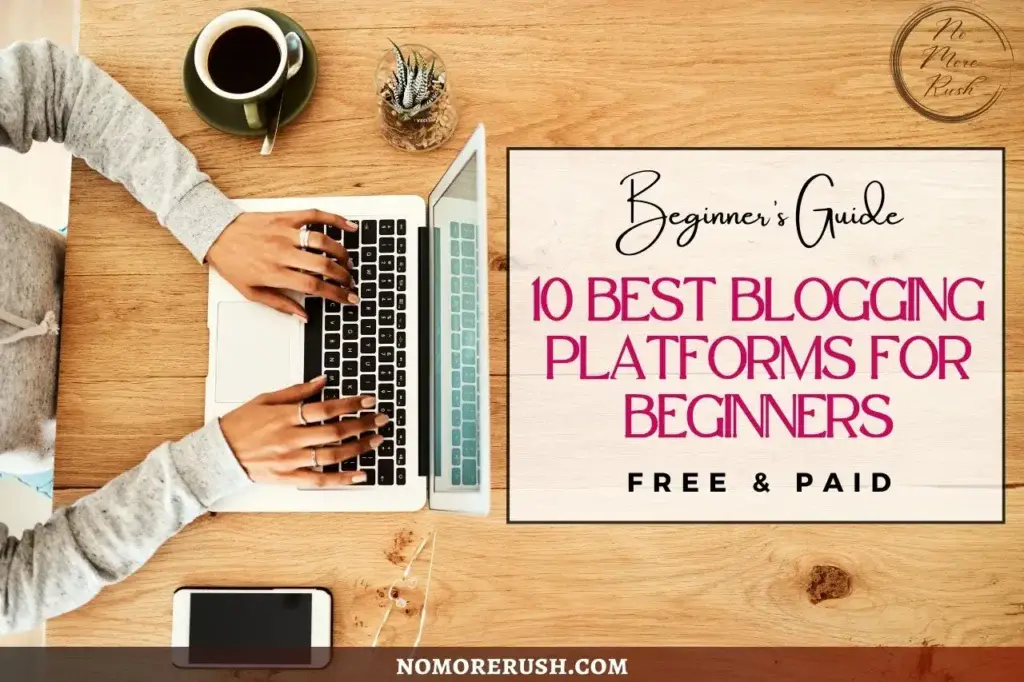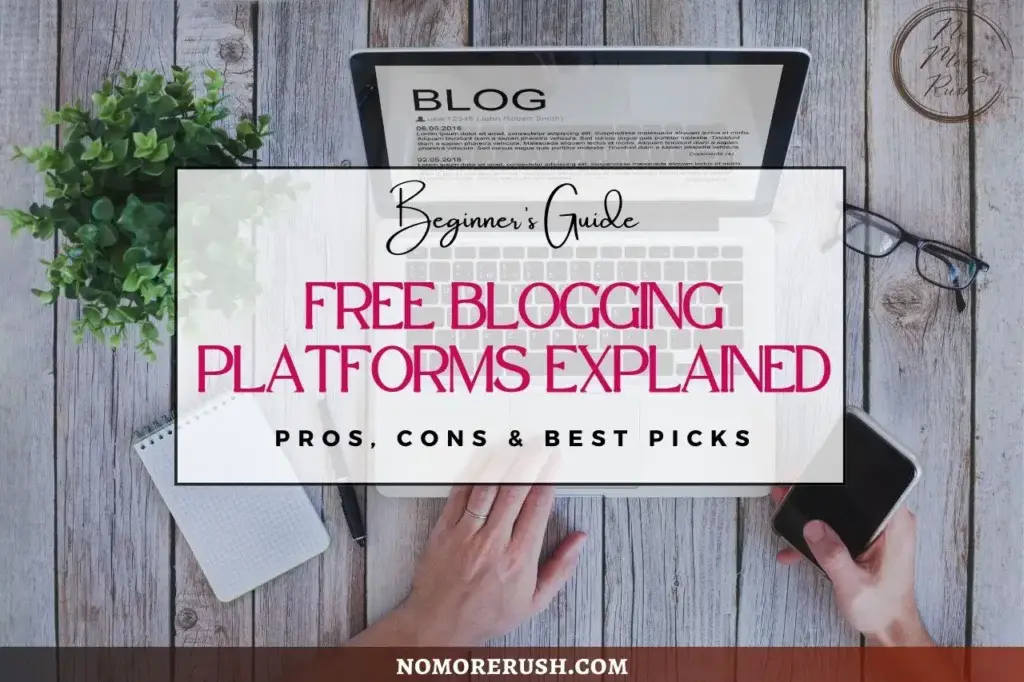Starting a blog is exciting, and so it should be, but let’s be honest, choosing where to build it can feel overwhelming. With so many platforms out there promising to be the best, how do you know which one is right for you? Well, the truth is that the best blogging platforms for beginners really depend on your goals.
Maybe you just want a simple place to share your thoughts, or maybe you’re dreaming of turning your blog into a full online business one day. Either way, the right choice now can save you a lot of time and headaches later.
In this guide, I’ve ranked and reviewed the top blogging platforms for beginners, breaking down their pros, cons, and best uses. Whether you want a free, no-fuss setup or a powerful self-hosted option with room to grow, you’ll find the right fit here.
By the end of this post, you’ll not only know which platform matches your needs the best but also feel confident about getting your blog up and running, without second-guessing your choice.
How to Choose the Right Blogging Platform
Before we dive into the list, it helps to know what really matters when picking a blogging platform. The best choice isn’t going to be the same for everyone. It all depends on your goals, your budget, and how much control you want over your blog. Here are the key things to consider:
1. Your Blogging Goals
This is a really important aspect to consider because you may well limit yourself or get more than what you need (or want to deal with) if you choose the wrong platform. So, ask yourself: Why am I starting a blog?
- If it’s just for fun or journaling, a free, simple platform like Medium or Blogger might be enough.
- If you want to build an online business, you’ll need more customisation and monetisation options, which makes WordPress.org or similar platforms better choices.
2. Ease of Use
Are you a total beginner who wants something that works right away? If that’s the case, then platforms like Wix or Weebly are drag-and-drop friendly, making them super easy for anyone just starting out. On the other hand, if you’re open to a small learning curve, WordPress.org offers far more flexibility.
3. Design & Customisation
Do you want your blog to look unique and professional, or are you okay with a simple template? Some platforms limit design freedom, while others let you fully customise your site.
4. Cost (Free vs. Paid)
Many platforms offer free versions, and these are great if you’re just testing the blogging waters, but they often come with restrictions (like ads, limited features, or lack of monetisation).

If you’re serious about earning money blogging, then the paid route, which requires you to invest in hosting, is usually the smarter move.
5. Monetisation Options
Not all platforms allow you to run ads, use affiliate marketing, or sell products on free plans. If you want your blog to grow into a source of income, choose a platform that supports monetisation.
6. Long-Term Scalability
Think about the future. Will you want to expand into a full website, add eCommerce, or grow your audience? A scalable platform like WordPress.org will give you the flexibility to grow without needing to switch later.
The bottom line is this. Don’t just pick the first option that looks easy. The right platform should match your goals today and support where you want your blog to go in the future.
The Best Blogging Platforms Ranked
Now that you know what to look for, let’s break down the best blogging platforms for beginners. I’ve ranked these based on ease of use, features, flexibility, and long-term potential, so whether you’re starting a hobby blog or building an online business, you’ll find the right fit.
1. WordPress.org (Self-Hosted)
Best Overall for Bloggers Who Want to Grow Long-Term
When it comes to blogging, WordPress.org (self-hosted WordPress) is the gold standard. It powers over 40% of all websites on the internet, from hobby blogs to major news outlets and gives you unmatched control, customisation, and monetisation options.
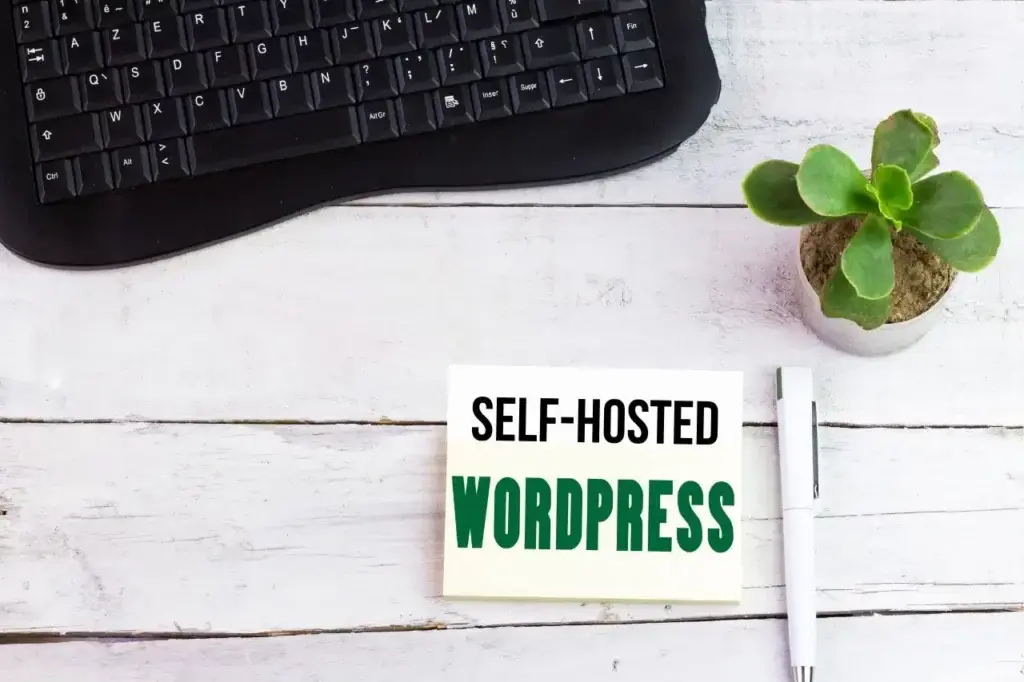
It’s open-source software, meaning that it’s free to use, but it does require web hosting, which will cost you a small fee. However, if you want your blog to grow into a business, then this is the most future-proof choice.
Ease of Use:
Beginners may face a slight learning curve, but once you get past the setup, the WordPress dashboard is pretty intuitive, so it doesn’t take long to get the hang of it. As an added bonus, many hosting providers like Bluehost or SiteGround often offer one-click installs that make starting much easier.
Features & Flexibility:
- Thousands of free and premium themes.
- 59,000+ plugins for SEO, eCommerce, memberships, etc.
- Full control over design, branding, and monetisation.
- Strong SEO foundation.
Pricing:
- Free software, but you’ll need hosting ($3–10/month to start) and a custom domain name (about $10–$20/year).
- Premium themes ($30–$70) and plugins (optional).
Pros:
- Total ownership of your website.
- Unlimited customisation.
- Monetisation freedom (ads, affiliates, products, memberships).
- Unlimited growth potential, so scalable for hobby blogs if you decide to turn them into full businesses.
Cons:
- Requires hosting setup and a domain name (not free).
- Small learning curve for complete beginners.
Best For: Bloggers who want to build a serious brand or online business.
Verdict: WordPress.org is the most powerful and future-proof choice for anyone serious about blogging. You’re not renting space, you own your blog. Whether you want to run ads, sell courses, or grow a full-scale business, WordPress.org has the flexibility and tools to make it happen.
2. WordPress.com
Best for Beginners Who Want to Start Simple
If WordPress.org feels intimidating, its sibling WordPress.com is a beginner-friendly alternative. It takes care of the hosting and setup for you, so you can focus on writing and publishing, not to mention that you can launch a blog in mere minutes.
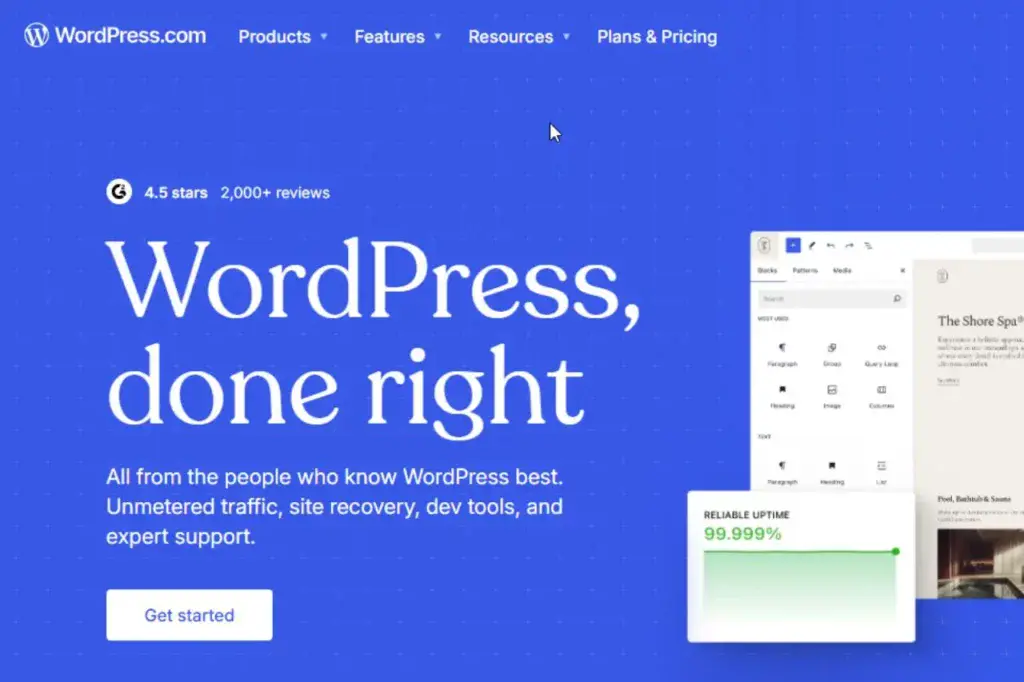
The free plan is a good starting point, and if you outgrow it, there are upgrade paths available for more customisation and monetisation options.
Ease of Use:
WordPress.com is extremely beginner-friendly, so there’s almost no learning curve here. Because hosting and setup are already taken care of, you can sign up, choose a theme, and publish your first post in minutes.
Features & Flexibility:
- Free and paid plans available.
- Limited customisation on free tier.
- Easy upgrade path to WordPress.org.
Pricing:
- Free plan with ads.
- Paid plans start at $4/month (removes ads, adds your own domain).
Pros:
- Quick to set up.
- Easy to use.
- Free plan available.
- Tech handled for you.
Cons:
- Ads and branding on the free plan.
- Restricted design customisation + monetisation.
- No custom domain on free plan (yourblog.wordpress.com instead of yourblog.com)
Best For: Beginners testing the waters before committing to self-hosted blogging.
Verdict: Think of WordPress.com as a “starter kit” for blogging. It’s a simple, stress-free starting point that gives you the chance to dip your toes into the blogging world with an easy upgrade path to the full power of WordPress.org when you’re ready.
3. Wix
Best for Creative, Design-Focused Bloggers
If you want your blog to look beautiful without learning code, Wix is a strong choice. Its drag-and-drop editor gives you complete visual control, so you can build a site that looks exactly the way you want it to.
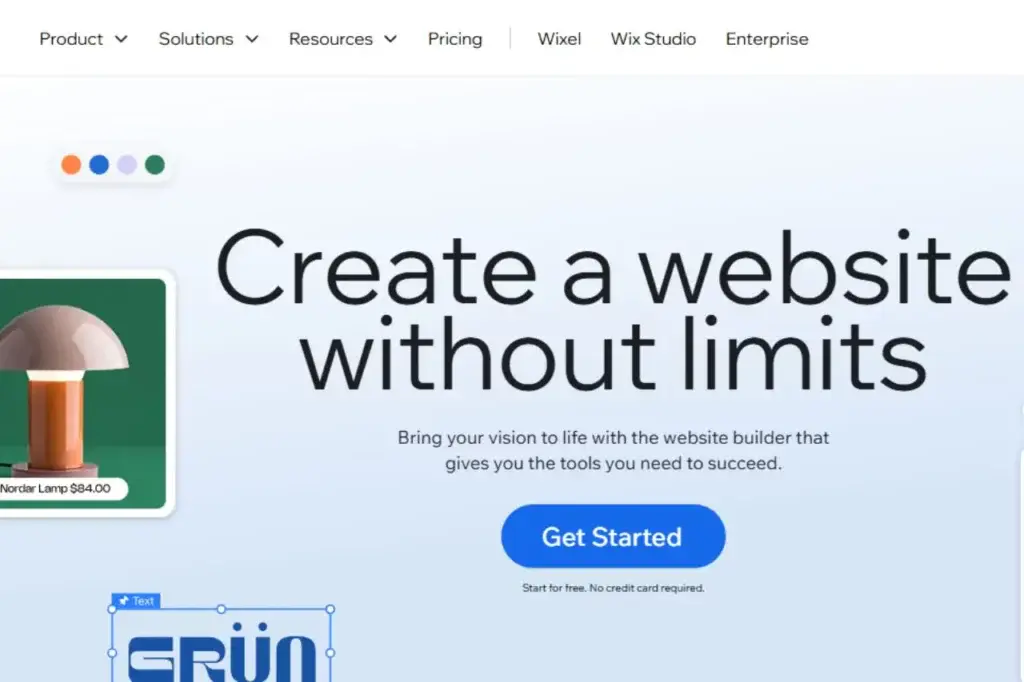
It also has plenty of templates to choose from, making it a strong favourite among creatives and design lovers.
Ease of Use:
Wix is a super-easy platform to use with true “what you see is what you get” editing, which makes it another great choice for beginners. There’s also no coding needed, which is great for those who are less tech-savvy.
Features & Flexibility:
- 800+ design templates.
- Built-in blogging and eCommerce tools.
- SEO tools, but not as advanced as WordPress.
Pricing:
- Free plan (with Wix branding and ads).
- Paid plans start at $17/month.
Pros:
- Easy drag-and-drop design.
- Polished templates.
- Free plan available.
Cons:
- Free plan feels restrictive and includes Wix branding.
- Expensive at scale.
- Less flexible long-term.
Best For: Bloggers who want their site to look professional from day one.
Verdict: Wix shines in its ease of design and user-friendly interface, and it’s a great choice for design-focused beginners. However, while it’s fun to use, it’s not as flexible for long-term growth compared to WordPress.
4. Squarespace
Best for Bloggers Who Want a Professional, All-in-One Solution
Known for its stunning templates and all-in-one approach, Squarespace makes blogging simple and stylish.

Everything from hosting, templates, and blogging tools is included in your plan, so you won’t need to worry about piecing things together. It’s an excellent choice if you want a turnkey solution with no tech stress.
Ease of Use:
Squarespace is another beginner-friendly platform, and because of its all-in-one nature, it’s a popular choice for any blogger who wants everything built in. Its templates are drag-and-drop, making them super easy to use, although it’s not quite as flexible as Wix or WordPress.
Features & Flexibility:
- Stunning design templates.
- All-in-one hosting, SSL, and blogging tools.
- Integrated eCommerce.
Pricing:
- No free plan.
- Paid plans start at $16/month.
Pros:
- Gorgeous templates.
- Hassle-free setup.
- Professional design.
- All-in-one package.
Cons:
- No free plan.
- Limited third-party integrations.
Best For: Bloggers who want a professional look without the headaches of setup.
Verdict: Squarespace is ideal if branding and design are your top priorities. It focuses on style and simplicity, which makes it perfect for design-focused bloggers. It’s not as flexible as WordPress or Wix, but if you want your blog to look sleek and professional with minimal effort, this platform delivers.
5. Ghost
Best for Serious Writers and Membership Blogs
Ghost is an open-source blogging platform built for publishing and speed. It’s a little different from the platforms listed so far in that it’s designed specifically for blogging, online publications and newsletters and has monetisation tools built in.

It’s clean, modern, fast, and great for professional writers or online publishers who want a minimalist, focused blogging experience and the ability to create memberships, newsletters and subscriptions.
Ease of Use:
Ghost is cleaner and more streamlined than WordPress, and at its core, easier to use for beginners. If you opt for Ghost(Pro), you’ll get managed hosting, which takes care of all the background technical stuff. However, if you choose the self-hosted route, you’ll need to have some technical know-how.
Features & Flexibility:
- Powerful editor.
- Membership + subscription tools built in.
- Fast, lightweight, SEO-friendly.
Pricing:
- Free if self-hosted.
- Ghost(Pro) starts at $9/month.
Pros:
- Optimised for writing + memberships.
- Open-source
- Built-in monetisation.
- Sleek, fast design.
Cons:
- Not as beginner-friendly if you choose self-hosted.
- Smaller community.
Best For: Writers building paid memberships or newsletters.
Verdict: Ghost is powerful and streamlined, and is an excellent choice for creators who want simplicity and built-in monetisation. However, for complete beginners who opt for the self-hosted route, the setup and maintenance may be a little overwhelming compared to WordPress or Wix.
6. Substack
Best for Newsletter-Focused Bloggers
Substack is more than a blogging platform; it’s a newsletter-first tool, so ideal for those who want to build a newsletter-based audience.

Every post you publish can go straight into your readers’ inboxes, and you can monetise through paid subscriptions, making it a great choice for independent writers and creators.
Ease of Use:
Substack is extremely easy to use and requires no technical know-how, making it perfect for complete beginners. It’s simple to sign up, and it takes care of all the tech stuff for you so you can focus on writing content without worrying about any technical learning curve.
Features & Flexibility:
- Newsletter-first with blog archives.
- Built-in subscriptions + payments.
- Minimal customisation.
Pricing:
- Free to use.
- Substack takes 10% of paid subscriptions.
Pros:
- Easy setup.
- Monetisation built in.
- Direct-to-inbox delivery.
Cons:
- Limited design and customisation.
- Reliant on Substack’s ecosystem.
- Substack takes a cut of your earnings.
Best For: Writers who want email-first publishing and want to monetise directly.
Verdict: Substack is perfect for newsletter-driven content creators who want a simple, easy-to-use platform that requires little to no tech knowledge. However, it does lack flexibility if you want to expand into a full-featured blog/online business.
7. Medium
Best for Writers Who Just Want to Write
If your priority is writing, and not web design, then Medium is your platform. It’s designed for storytellers and essayists who want to publish content without worrying about the technical side of blogging.

Medium has a built-in community, which makes it easier to get eyes on your work. It also has its own partner program for monetising your content.
Ease of Use:
Medium is one of the easiest to use out of all platforms. You don’t need to worry about hosting, plugins, themes or anything else related to running your own website. You simply sign up, write your content and publish. It’s that simple.
Features & Flexibility:
- Clean, minimalist editor.
- Built-in audience and distribution.
- Medium Partner Program for monetisation.
Pricing:
- Free to write.
- $5/month membership for extra perks.
Pros:
- No setup needed.
- Built-in audience.
- Clean reading experience.
Cons:
- No customisation.
- Readers belong to Medium, not you.
- Limited monetisation.
Best For: Writers focused on content who want exposure, not brand-building.
Verdict: Medium is a fantastic option for pure writers. It’s great for exposure and simplicity, but if you want to own your audience or build a brand, you’ll quickly run into its limitations.
8. Weebly
Best for Beginners Who Want Simplicity
Weebly is a straightforward, no-frills, drag-and-drop builder that works well for simple blogs and small websites.
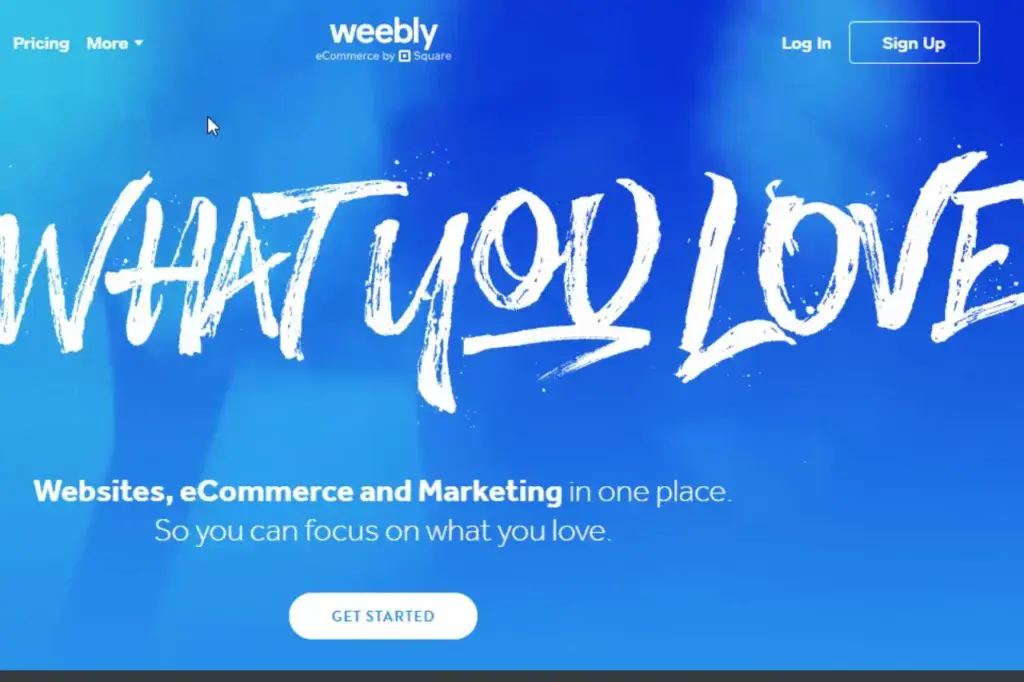
It’s beginner-friendly and comes with some basic eCommerce tools, although it’s not as advanced as platforms like Wix or WordPress.
Ease of Use:
Weebly is an extremely easy-to-use platform, making it a good fit for complete beginners. Its drag-and-drop editor makes customisation simple and straightforward. And because it’s a visual editor, there’s no need for any coding or technical know-how. It is similar to Wix but with less design flexibility.
Features & Flexibility:
- Drag-and-drop editor.
- Basic blogging tools.
- Small eCommerce features.
Pricing:
- Free plan (with ads).
- Paid plans start at $10/month.
Pros:
- Simple to use.
- Free plan.
- Basic store features.
Cons:
- Limited customisation.
- Ads on the free plan.
- Not scalable for big growth.
- Weaker design than Wix/Squarespace.
Best For: Beginners who want a quick setup and simple functionality.
Verdict: Weebly gets points for simplicity, and although it’s a good stepping stone, it’s limited and not for serious growth. If you plan on growing your blog into a larger online business, you’ll probably find its tools too limited.
9. Blogger (by Google)
Best for Casual Hobby Blogging
Blogger is one of the oldest blogging platforms still around, and it’s one of the simplest ways to start blogging for free.
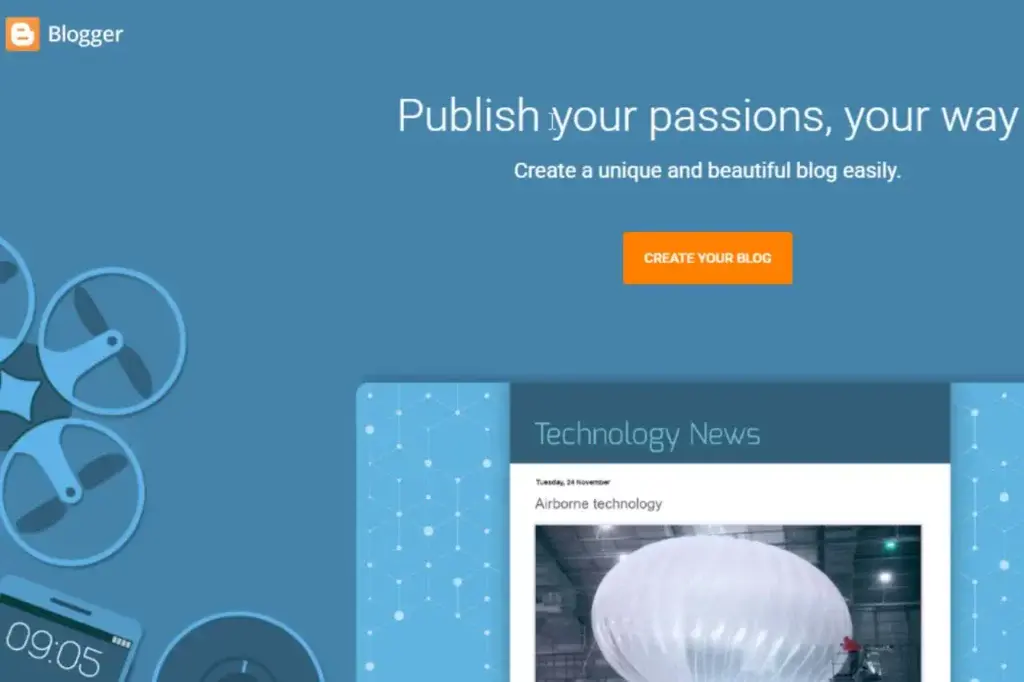
Because it’s owned by Google, it integrates easily with other Google services, which makes setup a breeze. However, its outdated templates and limited customisation mean it’s best suited for casual use.
Ease of Use:
Blogger is very beginner-friendly and also completely free to use. You can set it up using your Google account and create your own free blog in minutes. The simple interface is extremely easy to navigate and requires very little technical know-how, as hosting and tech aspects are all taken care of by the platform.
Features & Flexibility:
- Very basic templates.
- SEO benefits from being part of the Google ecosystem.
- Limited features compared to modern platforms.
Pricing:
- 100% free.
Pros:
- Free and reliable.
- Easy setup.
- Google integration.
Cons:
- Outdated design.
- Limited customisation and features.
- Poor Monitisation
- Poor for scaling into a business.
Best For: Hobby bloggers or those blogging for fun who want something simple and free.
Verdict: Blogger is reliable, free and great for casual writers, but too limited for long-term blogging goals. It’s fine for personal projects, but because it hasn’t kept up with modern blogging needs, serious bloggers will quickly outgrow it.
10. Tumblr
Best for Microblogging and Creative Sharing
Tumblr is a unique mix of blogging and social media. It’s ideal for short-form posts, visuals, casual content and community interaction.
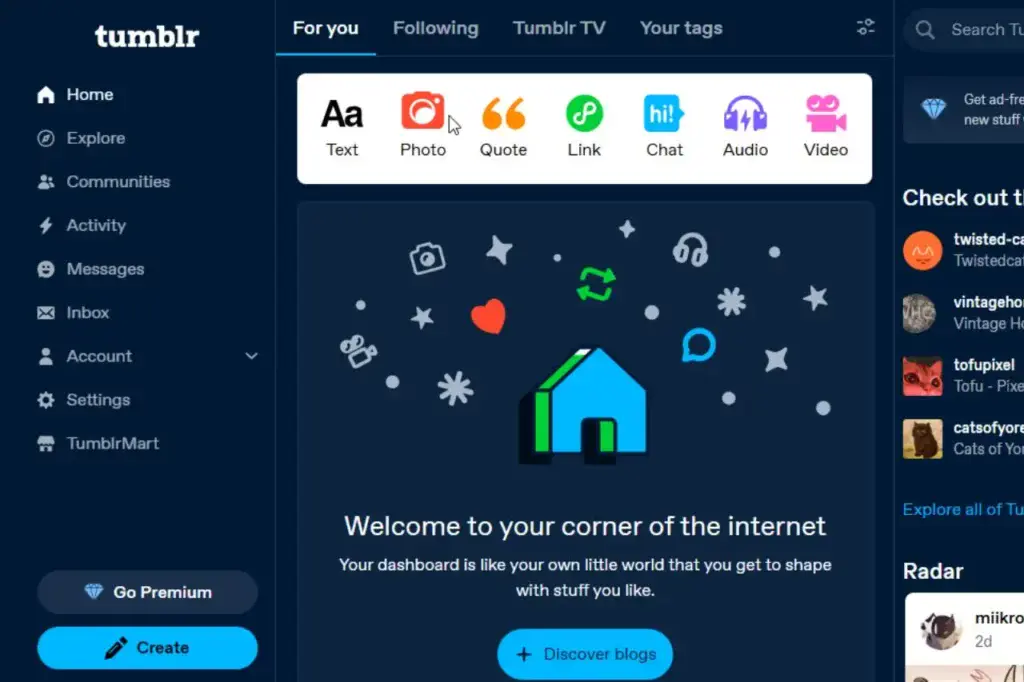
Although it’s not really built for professional blogging and it doesn’t offer much for customisation or monetisation. It does, however, have a vibrant community that makes it fun for creative expression.
Ease of Use:
Tumblr is very easy to use, so another perfect platform for complete beginners. The setup is quick and easy, and posting content is just as simple. However, it’s more like posting on a social media platform rather than your own website, so not ideal if you’re looking to grow your blog into a full business.
Features & Flexibility:
- Multimedia-friendly.
- Built-in social features (likes, reblogs).
- Limited customisation.
Pricing:
- Free to use.
- Premium themes available.
Pros:
- Fun, casual community.
- Great for creative expression.
- Free.
Cons:
- Not professional.
- Limited for serious blogging.
- Weak for monetisation.
Best For: Hobby bloggers, creatives, or anyone who wants a social blogging vibe.
Verdict: Tumblr is great for creative microblogging and for those seeking community-focused blogging. It’s fun and social, but it’s not the platform for serious business bloggers due to the lack of features needed for professional blogging.
Blogging Platforms Comparison Table
| Blogging Platform | Best For | Pros | Cons | Overall Score |
|---|---|---|---|---|
| WordPress.org (Self-Hosted) | Serious bloggers & online businesses | Full control, unlimited customisation, SEO-friendly, scalable | Requires hosting, learning curve | ⭐⭐⭐⭐⭐ |
| WordPress.com | Beginners testing the waters | Free to start, easy setup, upgrade path to WordPress.org | Ads on free plan, limited monetisation/customisation | ⭐⭐⭐⭐ |
| Wix | Creative, design-focused bloggers | Drag-and-drop editor, stylish templates, beginner-friendly | Branding on free plan, expensive upgrades | ⭐⭐⭐⭐ |
| Squarespace | Professional bloggers & brands | Sleek templates, all-in-one solution, no tech hassle | Paid only, fewer integrations vs WordPress | ⭐⭐⭐⭐ |
| Ghost | Writers & publishers building memberships | Open-source, fast, built-in memberships & subscriptions | Tech setup if self-hosted, fewer plugins than WordPress | ⭐⭐⭐⭐ |
| Substack | Newsletter-style blogging & email lists | Free to start, built-in email + paid subscriptions | Limited design, Substack takes a 10% cut of paid subs | ⭐⭐⭐ |
| Medium | Writers focused on content | Clean design, built-in audience, no setup | Limited monetisation, no ownership of audience | ⭐⭐⭐ |
| Weebly | Beginners who want simplicity | Easy to use, free plan, basic eCommerce | Limited features, ads on the free plan | ⭐⭐⭐ |
| Blogger (by Google) | Hobby blogging | 100% free, reliable, Google integration | Outdated, limited design, poor for growth | ⭐⭐⭐ |
| Tumblr | Hobbyists & creatives | Free, fun, social media-style community, easy posting | Limited customisation, not business-friendly | ⭐⭐ |
If your goal is building a long-term online business, WordPress.org is the clear winner. If you just want to write casually, Blogger, Tumblr, or Medium may be all you need.
For those whose priority is design and branding, Wix or Squarespace are strong picks. And if you want to focus on writing and monetising through memberships or newsletters, Ghost or Substack are worth exploring.
Free vs Paid Blogging Platforms: A Quick Recap
By now, you’ve seen that blogging platforms fall into two main categories – free and paid (self-hosted). Both have their place, but which one is right for you depends on your goals, budget, and how serious you are about blogging long term.
Free Blogging Platforms
Free blogging platforms (like WordPress.com, Blogger, Wix, or Medium) are perfect if you’re just experimenting with blogging, writing casually as a hobby or testing ideas without financial commitment. It’s a risk-free way to learn and see if blogging is something you’ll stick with.

There’s no upfront cost, they’re easy to set up, and they’re great for beginners. But customisation is limited, and ads may be placed on your site that the platform controls and earns revenue from. Your monetisation may also be restricted, and there’s no full ownership.
Paid Blogging Platforms
Paid Blogging Platforms, on the other hand, like WordPress.org, are the go-to for those who want to build a blog into a professional brand or business. You have full control to monetise through ads, affiliate marketing or selling products, and you can customise every aspect of your site.
Using paid platforms will often result in a more professional-looking site as well as vastly increasing your site’s scalability and income potential. The only minor drawback is that they require a small investment in hosting and a domain name, and often have a bit more of a learning curve.
Think of it this way: free platforms are like renting an apartment – you can live there comfortably, but you don’t own it. Paid/self-hosted platforms are like buying a house – you invest more upfront, but you own the space and can do whatever you want with it.
My Recommendation
After testing and researching the most popular platforms, here’s my honest advice for blogging beginners:
If you’re just dipping your toes into blogging, it’s totally fine to start with a free platform like WordPress.com or Blogger. These options let you get comfortable writing, publishing, and finding your voice without the pressure of costs or complex setups.

But if you already know that you want to take blogging seriously or if your end goal is to turn your blog into a source of income, then I strongly recommend skipping straight to self-hosted WordPress.org and here’s why:
- You Own It – Unlike free platforms, you’re in full control of your content, design, and monetisation.
- Professional Look – Having your own domain (yourblog.com) instantly builds trust with readers.
- Room to Grow – You’ll never “outgrow” WordPress.org. It’s flexible enough for beginners yet powerful enough for 7-figure businesses.
- Monetisation Ready – From day one, you can run ads, add affiliate links, or even sell digital products.
That’s why I recommend WordPress.org with affordable hosting as the best long-term choice. It’s an investment that pays for itself many times over once you start monetising.
Conclusion: Pick The Platform That’s Right For You
Choosing the right blogging platform might feel overwhelming at first, but the good news is, there’s no one-size-fits-all answer. It really depends on your goals, budget, and how serious you are about blogging. Once you know that, then the right platform should become obvious.
Remember: the platform you choose isn’t just about publishing posts, it’s about building the foundation of your future online business.
But don’t let the decision hold you back. Just start simple to get your blog up and running. You can always upgrade later as your blog and confidence grow.
At the end of the day, your platform is just the tool. What matters most is your voice, your consistency, and the value you provide your readers. Pick the platform that supports your journey, and start sharing your ideas with the world. You can do that no matter what platform you choose.
Ready to take the next step? Check out my step-by-step guide on How to Start a Blog and Make Money Online to get moving today!
Happy Blogging!

You May Also Like
- What to Look for in a Blogging Platform – Beginner’s Guide
- Best Blogging Platforms for Beginners – Free & Paid
- Free Blogging Platforms Explained – Pros, Cons & Best Picks

